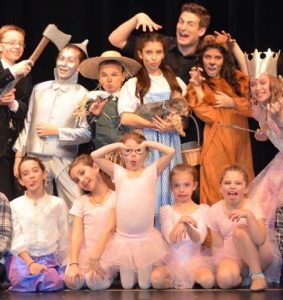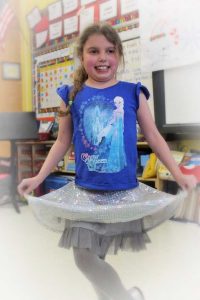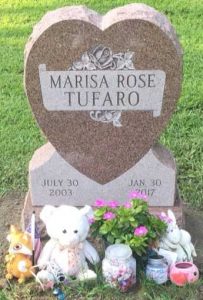Today is World Cancer Day and the anniversary of Marisa’s funeral mass at St. Francis Cathedral in Metuchen, where her father delivered this eulogy. Prayers for those battling cancer, others who’ve lost loved ones to the dreaded disease, and for finding a cure.
As a writer, I’m never supposed to be at a loss for words.
But after penning a tribute column and an obituary for Marisa during an emotionally draining week, the prose for this eulogy – unlike the tears for my beloved daughter – did not flow easily.
Fortunately, Jared Milian, an impressive young man who fostered Marisa’s love for musical theater, inadvertently came to the aid of a struggling writer, posting a poignant anecdote about my daughter on his Facebook page after her untimely passing.
With his story about Marisa’s participation in “The Wizard of Oz,” which Jared directed at the Forum Theater here in Metuchen five years ago, he eloquently captured my daughter’s quintessence.
“There was one little girl in particular, who lacked in size but had an overabundance of spirit,” Jared wrote. “On her first day, she went up and auditioned first in front of 40 kids she’d never met before. All 35 pounds of this girl marched on stage and sang the most excited and animated version of ‘Part of Your World’ that I’d ever heard. We all – kids and adults – fell completely in love.”

“She had a slew of health problems, but was consistently managing them with the help of her incredible family. She had been through countless surgeries and procedures but still had to be told to take a break every hour or so.”
“On the final night of ‘The Wizard of Oz’ she woke up tired and a little weak, so her mother had to pull her from performing. Of course, as any theatre person knows, it’s heartbreaking missing the last show. I was so sad for her and begged her mom to bring her to the ice cream party afterward, if she could muster the strength.”
“I wasn’t prepared for how heartbroken the kids all were because their friend couldn’t perform with them. They were all crying, and making her cards and videos while they got ready for their performance. It truly was a magical theatrical moment as they all got together and performed the show – for her.”
“I think of those kids every day and they will always have a place in my heart. Sadly, today I was informed that this beautiful little girl had gone to a better place. She was one of the strongest people I’ve ever met.”
“Marisa, I’m so sad to hear that you are gone, but I can assure you that myself, the staff of the Forum Theater and every kid in that program – along with everyone who ever met you – will never ever forget you. You were a beautiful little girl and I hope I made as much of an impact on your life as you did mine.”
As her father, I can say without equivocation that Marisa, incredulously, never realized how many people she impacted or how amazing and inspirational her life truly was.
I recently pondered this paradox with my dear friend, Lynda Zapoticzny, who was Marisa’s elementary school principal. Lynda explained that what others perceived as extraordinary was simply the norm for Marisa.

Enduring open-heart surgery – Marisa had seven such operations, the first taking place a day after she was born – or being hospitalized was an unfortunate part of Marisa’s life, but one she reluctantly accepted and eventually embraced. Other children may have been sobbing uncontrollably or at least somewhat nervous in the waning moments before a heart transplant, but Marisa remained unflappably calm, even laughing with the medical team while lying on the operating table in the minutes before she was anesthetized.
Marisa cried just once upon contemplating her transplant, asking a question that epitomized her compassion and sensitivity: “Why does somebody else have to die to save my life? It’s not fair.”
A famous boxing promoter, who was the grandfather of a patient in a hospital room adjacent to Marisa’s during her admission last summer, agreed with me that, pound-for-pound, Marisa was among the world’s toughest fighters. Her transplant surgery lasted 19 hours – the longest such bypass run in the history of pioneering Columbia University Medical Center, which in 1984 conducted the nation’s first successful pediatric heart transplant. The record – and a 73-day long postoperative recovery that was difficult beyond words – was, as Lynda suggested, simply the norm for Marisa.
“She never let anything stand in her way and this persisted throughout her entire life,” one of Marisa’s doctors from Children’s Hospital of Philadelphia wrote to me and Cyndi in a letter of condolence. “Even as a baby she was feisty and determined. I think her ability to get through all that life threw at her, enabled her to get so far. She did so with remarkable courage. Marisa taught me how to be a better doctor, and I will always be in her debt for that. She challenged all of us to think of ways we could try to help her.”
 Dr. Linda Addonizio, the founder of Columbia University Medical Center’s pediatric heart transplant program, who Marisa adored, told Cyndi and me that her team will work to develop what she will call “The Marisa Plan” to help children defeat the same rare cancer, known as posttransplant lymphoproliferative disorder, that tragically cut short our daughter’s life. The plan will be part of Marisa’s enduring legacy.
Dr. Linda Addonizio, the founder of Columbia University Medical Center’s pediatric heart transplant program, who Marisa adored, told Cyndi and me that her team will work to develop what she will call “The Marisa Plan” to help children defeat the same rare cancer, known as posttransplant lymphoproliferative disorder, that tragically cut short our daughter’s life. The plan will be part of Marisa’s enduring legacy.
A private person, Marisa rarely discussed her medical condition, in part because she did not want it to define her, but largely because she did not want it to prevent her from being like other kids. Despite the challenges she faced, Marisa accomplished more in her short 13 years than many will in a lifetime.
She was an honor roll student, student council vice president, participated in annual spring musicals, wrote for the school newspaper, sang in the school chorus, played percussion in the school orchestra, was a member of various clubs and traveled to eight states. She served on the Youth Advisory Council at Children’s Hospital of Philadelphia, took dance classes and vocal lessons, was a gifted artist and developed a love for horses at a therapeutic riding center.
“The relationship between Marisa and Johnny amazed me,” one of the therapists at the riding center recently wrote to Cyndi and me about a horse our daughter met. “Johnny is our least affectionate pony. He doesn’t like to be hugged, petted or fawned over. But he saw something special in Marisa and responded to her with a gentleness and love that he rarely expresses.”
Unlike Marisa, who failed to see herself as awe-inspiring, it took little time for God to recognize her gifts and call her from this earth to be by His side. There is no other way for us to rationalize Marisa’s untimely death. I’m certain that Marisa has already been busy doing God’s work as a guardian angel.
 Lisa Salberg, a family friend who is the founder and Chief Executive Officer of the nonprofit national Hypertrophic Cardiomyopathy Association, first met Marisa several years ago. Through cardiac defects, they shared a common bond. Lisa had been on a waiting list for a new heart. She sent me the following text from her hospital bed on Thursday at 5:20 a.m.
Lisa Salberg, a family friend who is the founder and Chief Executive Officer of the nonprofit national Hypertrophic Cardiomyopathy Association, first met Marisa several years ago. Through cardiac defects, they shared a common bond. Lisa had been on a waiting list for a new heart. She sent me the following text from her hospital bed on Thursday at 5:20 a.m.
“I had every intention on coming to pay my respects to your beautiful daughter on Friday, however my plans radically changed at 12:30 this morning. I got the call for my new heart. Your daughter is not far from my thoughts as I lay here waiting.”
I’m certain Marisa has something to do with the fact that Lisa’s new heart is now beating strongly on its own.
Hours after Lisa underwent transplant surgery, another family friend, Katie Marsala, took her toddler twins to the beach and went sea glass hunting, an activity she’s enjoyed for nearly a decade. Katie has long searched fruitlessly for an extraordinarily rare piece of red sea glass. Knowing nothing about sea glass, I consulted an expert’s website and learned the following.
“After years of studying thousands of pieces, both from our collection and after interviewing and seeing hundreds of other collector’s compilations from across the globe, it’s a proven fact that red is one of the most difficult colors of sea glass to find. It’s been said to take a lifetime of hunting to find just one piece.”
Katie sent my wife a text on Thursday afternoon: “I found the most perfect red piece – tiny, but perfect,” she wrote. “An exact half of a heart. I can’t help but know I found your piece of red sea glass that was meant for you.” I’m certain, again, that Marisa played a role in that remarkable find, and I also suspect she has the other half of Katie’s heart-shaped red sea glass.

If you take the time to look hard enough, as Katie did for her red sea glass, or wait long enough, as Lisa did for her new heart, you will find subtle signs that Marisa remains with us in spirit. Know that she is watching over all of us now.
Through the formation of a foundation that is being established in Marisa’s name, our daughter will continue to make an impact on the lives of many. Every penny raised through the foundation will benefit pediatric patients and children in need throughout the greater Middlesex County area.
The first person with whom I spoke on the night Cyndi and I returned home from the hospital after Marisa passed away was our daughter’s middle school principal Brian McGrath, who helped me make sense of her tragic death.
“I learned so much from Marisa, especially the way she carried herself through it all,” Brian wrote in an email the following day. “The news of her passing struck our staff and students in a profound way. Marisa was a special girl and everyone here recognized that from her first day.”
Brian told me I could allow Marisa’s passing to tear me apart, or that I could celebrate her life by keeping alive her memory.
Instead of making me question my faith, Marisa’s death has actually strengthened my belief in God, for I believe it is only through Him that I can ever be reunited with my beautiful daughter.
I pray, sweet Marisa, that mommy and daddy will be with you one day in heaven.

